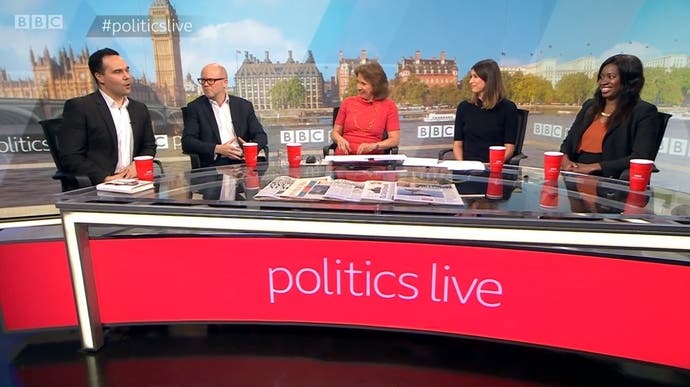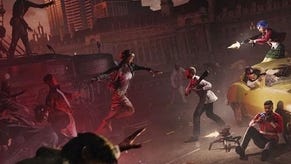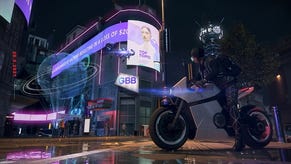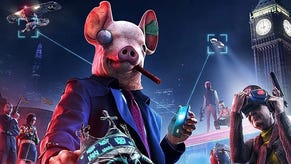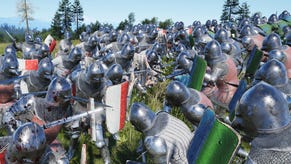Of course Watch Dogs: Legion made it onto the BBC
"It doesn't feel particularly serious."
Watch Dogs: Legion, unveiled at E3 this week, is set in a post-Brexit Britain. It deals with themes of civil unrest, the surveillance state and, from the looks of things, dodgy London accents.
Inevitably, Ubisoft's latest open-world adventure has caught the attention of the mainstream media. Today, the BBC's Politics Live show featured a segment on Watch Dogs: Legion, asking the question: does it offer a realistic portrayal of our future?
The segment began with a film based on an interview with Legion's creative director, Clint Hocking, who said the team were already a year-and-a-half into development and had settled on the London location when the Brexit vote happened.
"Brexit in our game is not the cause of the problems we're depicting in the game world," Hocking insists in the interview.
"The causes of Brexit are the causes of the problems in our world. That's really how we address it."
After a brief discussion of Call of Duty: Modern Warfare and its gritty portrayal of a terrorist attack in London, the segment switches back to the studio panel, which discusses Watch Dogs: Legion.
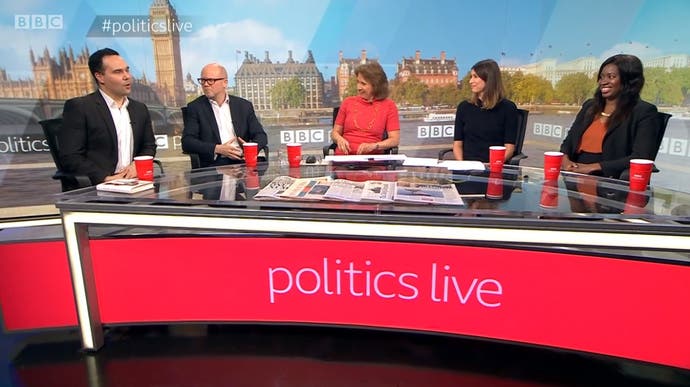
Brexit supporter Toby Young, from The Spectator is, as you'd expect, dismissive of Legion's post-Brexit dystopian London.
"As a Brexit supporter the temptation is to become outraged they're portraying Brexit as being such a disaster when actually so far no disaster has materialised," he says in the show.
Young says Watch Dogs: Legion is symptomatic of "the paranoid style", an idea drummed up by American historian Richard J. Hofstadter, aka "these feverish apocalyptic fantasies, these conspiracy theories", that used to be "something which was true of the popularist right".
"But since Brexit and Trump's victory in 2016, the paranoid style, these paranoid apocalyptic fever dreams, seem to have migrated to the left, and this feels like an example of that."
Aaron Bastani of Novara Media counters Young's point, saying Brexit "will lead to quite dystopian outcomes"... "but more like the Chinese state, where you have all-seeing consumer surveillance synergised with state surveillance".
Bastani continues: "I doubt the explosions and all the interesting costumes, but I do think that confluence of crises meeting big data in a potentially authoritarian state or authoritarian for of capitalism could be quite concerning.
"What that kind of speculative fiction allows us is to say, well the world is really going to change, do we want it to change for the better or for the worse?"
Young comes back in, saying of Watch Dogs: Legion: "It doesn't feel particularly serious.
"It feels like another manifestation of a dystopian satire emerging from mass culture, but none of these dystopian satires have actually materialised."
Claire Cohen of Boris Johnson blog The Daily Telegraph then enters the ring, saying Watch Dogs: Legion may generate controversy because Ubisoft "seem to be trying to distance themselves from the fact it's pegged to the causes of Brexit" and... "That might cause a bit of a stir with those who disagree."
Then: "How amazing would it be if gaming was the thing that united the left and right eventually? It could happen."
The Watch Dogs: Legion debate then ends with a comment from Miatta Fahnbulleh of the New Economics Foundation, who thanks Ubisoft for shining a light on the causes of Brexit.
"It may not be the dystopia, but the underlying drivers of Brexit, yes there were people who voted for the European Union, but for a lot of people it was despair and discontent with the economic system, with an economic system that still benefits a tiny proportion of people where people aren't feeling the benefit in the majority," she says.
"The problem in all of the debate of the last three years is we've gone away from that. And we're not talking about those issues and we're not talking about how we need to respond. We're talking about the ins and outs of whether we leave or how we leave, and that is a problem.
"If it takes the gaming industry to shine a spotlight on that? Thank you very much."
So there you have it - the inevitable debate around Watch Dogs: Legion and its post-Brexit Britain in the mainstream media has begun. As the BBC suggests, the game doesn't exactly offer a flattering portrayal of near-future London - in fact it puts forward a London that's gone to the dogs.
But is it about politics? Given Watch Dogs: Legion has made it onto the BBC's Politics Live show, I'm going to go with a big fat yes.
You can watch the episode of BBC's Politics Live in question on the BBC iPlayer.
